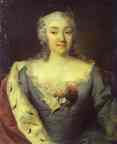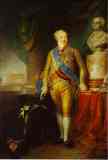The Princes Kurakins
 Kurakina,
Alexandra Ivanovna (1711-1786), Princess, daughter of the Lieutenant
General and Senator Prince Ivan V. Panin (1673-1736) and Agraphena Everlakova
(1688-1753). In 1730 she married Prince Alexander B. Kurakin (1697-1749),
Secret Councilor and the Russian Ambassador to Paris. They had one son
and eight daughters. After her husband's death she constantly lived in
Moscow and brought up her children. Her only son,
Prince Boris Leonti
Alexandrovich Kurakin (1733-1764), also became a Senator. He married
Elena S. Apraksina and had two sons by her. In the portrait by Grooth he
is a warrant officer of the Preobrazhensky Guards’ Regiment. After his
early death, Alexandra Ivanovna brought up his sons, her grandsons, Princes
Alexander (1752-1818), see his portraits by Borovikovsky, and Alexey (1759-1829).
After marrying off her daughters and grandsons she lived alone in her big
Moscow house, where all the family liked to gather. She was deeply respected
by her contemporaries. Until the end of her life she was very active, liked
hunting, horseback riding and long walks. She was deeply religious and
had friends among outstanding theologians and clergy of her time.
Kurakina,
Alexandra Ivanovna (1711-1786), Princess, daughter of the Lieutenant
General and Senator Prince Ivan V. Panin (1673-1736) and Agraphena Everlakova
(1688-1753). In 1730 she married Prince Alexander B. Kurakin (1697-1749),
Secret Councilor and the Russian Ambassador to Paris. They had one son
and eight daughters. After her husband's death she constantly lived in
Moscow and brought up her children. Her only son,
Prince Boris Leonti
Alexandrovich Kurakin (1733-1764), also became a Senator. He married
Elena S. Apraksina and had two sons by her. In the portrait by Grooth he
is a warrant officer of the Preobrazhensky Guards’ Regiment. After his
early death, Alexandra Ivanovna brought up his sons, her grandsons, Princes
Alexander (1752-1818), see his portraits by Borovikovsky, and Alexey (1759-1829).
After marrying off her daughters and grandsons she lived alone in her big
Moscow house, where all the family liked to gather. She was deeply respected
by her contemporaries. Until the end of her life she was very active, liked
hunting, horseback riding and long walks. She was deeply religious and
had friends among outstanding theologians and clergy of her time.
See: Georg Christoph Grooth. Portrait
of Princess Alexandra Kurakina. Portrait
of Prince Boris Kurakin.
 Kurakin,
Alexander Borisovich (1752-1818), Prince, son of Prince Boris Leonti
Alexandrovich Kurakin (1697-1749) and Elena S. Apraksina. In his childhood
he was educated with the heir to the Russian throne, Grand Duke Pavel Petrovich
(future Paul I). Then Kurakin studied in Leiden University. Since 1775
he was a Senator. In 1778 he was appointed Chamberlain, and then the Chief
Procurator of Senate. The service did not interfere with his travel with
the Grand Duke abroad. Catherine II, however, did not like this friendship,
as the Grand Duke was very attached to Kurakin and even called him “my
soul”. She used a small pretext to order Kurakin to settle in his estate
Nadezhdino in Saratov region. The correspondence between Kurakin and Grand
Duke Pavel Petrovich went on and after the ascension of the latter to the
throne, Kurakin was welcomed back to St. Petersburg. During November 1796
he was made a Secret Councilor, a member of the Emperor's Council, and
Vice-Chancellor; he was awarded orders of St. Vladimir 1st degree and St.
Andrew. He was presented with a big house in St. Petersburg and 4000 serfs
and estates in Astrakhan region. In 1798, however, he fell into disgrace
with the uncertain and suspicious Emperor and had to leave for Moscow.
Not long before his death Emperor Paul I returned Kurakin to the post of
Vice-Chancellor, and the next Emperor, Alexander I, made him the chancellor
of the Russian orders and charged him with diplomatic missions. Thus prince
Kurakin participated in the signing of the Treaty of Tilsit. In 1809-1812
Kurakin was a Russian ambassador in Paris. He wrote
Memoirs.
Kurakin,
Alexander Borisovich (1752-1818), Prince, son of Prince Boris Leonti
Alexandrovich Kurakin (1697-1749) and Elena S. Apraksina. In his childhood
he was educated with the heir to the Russian throne, Grand Duke Pavel Petrovich
(future Paul I). Then Kurakin studied in Leiden University. Since 1775
he was a Senator. In 1778 he was appointed Chamberlain, and then the Chief
Procurator of Senate. The service did not interfere with his travel with
the Grand Duke abroad. Catherine II, however, did not like this friendship,
as the Grand Duke was very attached to Kurakin and even called him “my
soul”. She used a small pretext to order Kurakin to settle in his estate
Nadezhdino in Saratov region. The correspondence between Kurakin and Grand
Duke Pavel Petrovich went on and after the ascension of the latter to the
throne, Kurakin was welcomed back to St. Petersburg. During November 1796
he was made a Secret Councilor, a member of the Emperor's Council, and
Vice-Chancellor; he was awarded orders of St. Vladimir 1st degree and St.
Andrew. He was presented with a big house in St. Petersburg and 4000 serfs
and estates in Astrakhan region. In 1798, however, he fell into disgrace
with the uncertain and suspicious Emperor and had to leave for Moscow.
Not long before his death Emperor Paul I returned Kurakin to the post of
Vice-Chancellor, and the next Emperor, Alexander I, made him the chancellor
of the Russian orders and charged him with diplomatic missions. Thus prince
Kurakin participated in the signing of the Treaty of Tilsit. In 1809-1812
Kurakin was a Russian ambassador in Paris. He wrote
Memoirs.
Contemporaries say that Prince Boris Kurakin was kind-hearted, but
very vain and liked luxury. For his love of brilliance he was called “the
diamond prince”. Prince Kurakin was a pedant of etiquette and dress: he
strictly observed the rules of what, where and how to wear. The prince
was not married, but was very fond of women and had about 70 illegitimate
children. The Barons Vrevskys and Serdobins are descended from him.
See: Vladimir Borovikovsky. Portrait
of Prince A. B. Kurakin. Portrait
of Prince A. B. Kurakin.
Kurakin, Alexey Borisovich (1759-1829) Prince, son of Prince
Boris Leonti Alexandrovich Kurakin (1697-1749) and Elena S. Apraksina,
the younger brother of Alexander Kurakin. Camberlain, Procurator General,
later Minister for Internal Affairs.